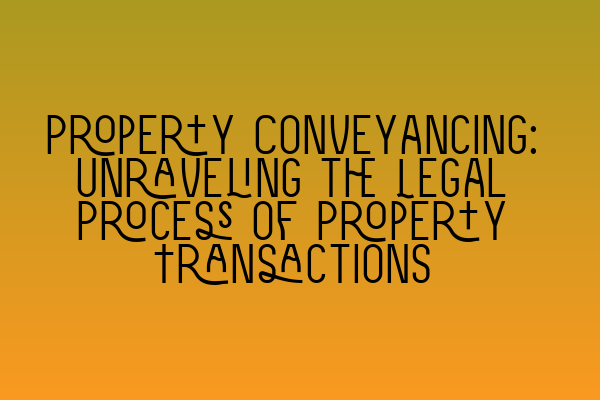Property Conveyancing: Unraveling the Legal Process of Property Transactions
Welcome to SQE Property Law & Land Law, your trusted solicitors specializing in property conveyancing. Whether you are buying or selling a property, understanding the legal process involved in property transactions can be quite daunting. In this comprehensive guide, we will unravel the complexities of property conveyancing, helping you navigate through the intricacies of the legal system with ease.
1. Introduction to Property Conveyancing
Property conveyancing refers to the legal process of transferring the ownership of a property from one party to another. It involves several stages and requires a solicitor or conveyancer to handle the legal aspects of the transaction. The process typically begins with the initial offer and negotiation, followed by the exchange of contracts, completion, and finally, registration of the property transfer.
2. Importance of Property Conveyancing
Conveyancing is a crucial step in any property transaction as it ensures a smooth and legally binding transfer of ownership. By engaging a solicitor or conveyancer to handle the conveyancing process, you can be confident that your interests are protected, and all necessary legal requirements are fulfilled.
Proper conveyancing helps to identify any potential issues or risks associated with the property, such as outstanding debts, boundary disputes, or planning restrictions. It also ensures that all relevant documents, such as contracts and deeds, are properly drafted and executed, minimizing the risk of future disputes.
3. Key Stages of Property Conveyancing
Property conveyancing involves several key stages, each requiring careful attention to detail. Let’s take a closer look at these stages:
3.1. Initial Offer and Negotiation
The first stage of property conveyancing involves making an initial offer to purchase the property and negotiating the terms of the transaction. This includes determining the purchase price, any special conditions, and the timeline for completion.
It is essential to engage a solicitor or conveyancer at this early stage to provide guidance and ensure that your interests are represented throughout the negotiation process.
3.2. Due Diligence
Once the initial offer is accepted, the buyer’s solicitor will carry out due diligence on the property. This involves conducting various searches and checks to uncover any potential issues, such as planning permission disputes, environmental concerns, or rights of way.
These searches are vital to protect the buyer’s interests and ensure that they are aware of any potential risks associated with the property. The results of these searches will also inform the negotiation of the final terms of the transaction.
3.3. Exchange of Contracts
The exchange of contracts is a significant milestone in the conveyancing process. At this stage, both the buyer and the seller sign the contract, making the transaction legally binding.
Prior to the exchange, the buyer will typically pay a deposit, usually around 10% of the purchase price. The completion date is also agreed upon at this stage, which is when the final payment is made, and the property officially changes ownership.
3.4. Completion
The completion stage marks the finalization of the property transaction. The buyer’s solicitor will ensure that the remaining funds are transferred to the seller’s solicitor, and all necessary documents, such as the transfer deed and mortgage deed, are executed.
Once the completion has taken place, the buyer can take possession of the property, and the seller will vacate the premises.
3.5. Registration of Ownership
The final stage of property conveyancing involves registering the change of ownership with the Land Registry. This step ensures that the buyer’s details are officially recorded as the new owner of the property.
It is essential to complete this registration process promptly to establish legal ownership and protect your interests in the property.
4. Engaging a Solicitor for Property Conveyancing
To ensure a smooth and successful property conveyancing process, it is highly recommended to engage a solicitor or conveyancer who specializes in property law. A skilled professional will guide you through the legal complexities, handle all necessary paperwork, and provide expert advice throughout the transaction.
At SQE Property Law & Land Law, our team of experienced solicitors are experts in property conveyancing. We understand the intricacies of the legal process and can provide you with the support and guidance you need to navigate through your property transaction with ease.
If you would like assistance with your property conveyancing needs, please do not hesitate to contact us for a consultation. We offer a range of SQE 2 preparation courses as well as SQE 1 preparation courses to help you prepare for your legal career.
Conclusion
Property conveyancing is a complex legal process involved in property transactions. Understanding the stages involved and engaging a solicitor or conveyancer can ensure a smooth and legally secure transfer of ownership. By entrusting your property conveyancing needs to SQE Property Law & Land Law, you can have peace of mind knowing that your interests are protected, and the legal requirements are met. Contact us today to discuss your property conveyancing needs.
Related Articles:
